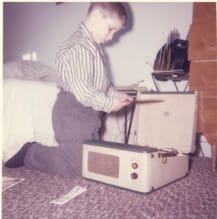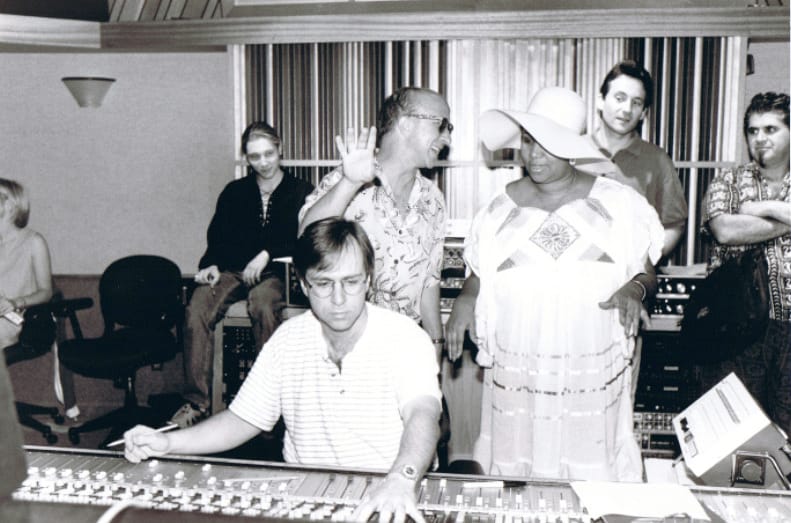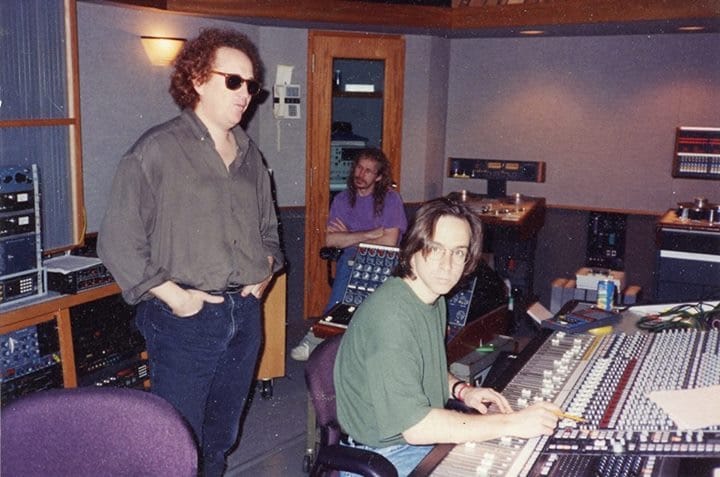Jeff Wolpert: Master of Sound Engineering and Audio Innovation

In the intricate world of sound engineering and music production, few names command as much respect as Jeff Wolpert. A multi-award-winning engineer, mixer, producer, and educator, Wolpert has spent over four decades shaping the sonic landscape of contemporary music while simultaneously pioneering advances in immersive audio technology. His work bridges the gap between artistry and technology, creating auditory experiences that transcend traditional listening boundaries.
Educational Foundation and Early Career
Jeff Wolpert's journey into the world of professional audio began with a solid academic foundation. He earned his Bachelor of Fine Arts (BFA) in Studio Music from Concordia University in Montreal, followed by a Master of Music Degree in Sound Recording (Tonmeister) from McGill University in 1982. This specialized program, known for producing some of the industry's finest recording engineers, provided Wolpert with both the technical expertise and musical sensibility that would define his career.

Upon graduation, Wolpert started as a system technician and mixer at PA Plus in Toronto, gaining hands-on experience in the rapidly evolving world of professional audio. This entry-level position would prove to be the launching pad for what would become one of Canada's most distinguished careers in sound engineering.
Building an Empire: The Inception Sound Years
Wolpert's next career move was to Inception Sound, where he spent eleven transformative years. During this period, he played a crucial role in the studio's expansion. helping to build it from a modest one 24-tracone-track facility into a sophisticated two 48-track studio complex. This experience not only honed his technical skills but also gave him invaluable insight into studio design, acoustics, and the business aspects of professional audio production.
The Inception Sound years were formative for Wolpert, allowing him to work with a diverse range of artists and projects. This period established his reputation for technical excellence and musical sensitivity—qualities that would become his trademark throughout his career.
Chief Engineer at McClear Digital
Following his successful tenure at Inception Sound, Wolpert advanced to become the chief engineer at McClear Digital Recording and Post Production Studios, a five-studio multi-format recording and mixing facility. This role expanded his expertise beyond music recording into the realm of post-production, laying the groundwork for his later success in film and television sound.
At McClear Digital, Wolpert refined his skills in various audio formats and began working with the surround sound technologies that would later become central to his innovative approach to audio production. His ability to master multiple formats and adapt to emerging technologies would prove instrumental in his future success.
Recognition and Awards: The JUNO Years
Wolpert's exceptional talent has been recognized with three JUNO Awards for Recording Engineer of the Year, winning in 1993, 2001, and 2004. He has also received JUNO nominations in 1995, 1997, 2008, 2011, and 2012, making him one of Canada's most frequently recognized audio engineers. His first JUNO was for Loreena McKennitt’s The Visit
His 2001 JUNO Award was for his work on Make It Go Away and Romantically Helpless by Holly Cole, while his 2004 award recognized his engineering on Heat Wave and Something Cool, also by Holly Cole. These awards not only validated his technical prowess but also highlighted his long-standing collaborative relationships with artists who valued his unique approach to sound.
Desert Fish Studios: A Creative Haven
In 2012, Wolpert realized a long-held dream by opening Desert Fish Studios in downtown Toronto. Located in the historic Urbanspace building at 401 Richmond Street West in the heart of Toronto's Entertainment District, Desert Fish Studios represents the culmination of Wolpert's decades of experience in studio design and operation.

The studio is equipped with state-of-the-art technology, including an SSL 24-input console, a 24-track analog tape machine, and a comprehensive collection of vintage and modern analog gear from manufacturers such as Sontec, dBx, Oram, Crookwood, Focusrite, and Avalon. This carefully curated equipment selection reflects Wolpert's philosophy of combining the warmth and character of vintage gear with the precision and flexibility of modern technology.
Pioneering Dolby Atmos Music
Wolpert has been at the forefront of immersive audio technology, particularly Dolby Atmos Music. Desert Fish Studios features a custom-designed and Dolby-calibrated 9.1.4 Dolby Atmos mix room, making it one of Canada's leading facilities for spatial audio mixing.
Reflecting on this technology, Wolpert has said, "I've always believed that music should involve the listener and that it was my job to make the mix as engaging as possible. For the past few years I've been working with Dolby immersive audio to explore how to make the experience truly immersive. Dolby Atmos Music finally makes it possible for everyone to get in the pool and be submerged in truly spatial audio. It really is a game changer."
Collaborations with Legendary Artists
Throughout his career, Wolpert has worked with an impressive roster of artists spanning multiple genres and generations. His long-standing collaboration with Celtic artist Loreena McKennitt has been particularly noteworthy, beginning in 1987 with her seasonal recording To Drive The Cold Winter Away, followed by "Parallel Dreams in 1989.
Wolpert has recorded McKennitt in some of the world's most exotic locations, including the Alhambra palace in Spain for Nights From the Alhambra and various venues during her 2009 Mediterranean Tour in Lebanon, Hungary, Italy, and Greece. Of their partnership, Wolpert has noted, "We're the same age, Loreena and I. I can remember her playing early one morning to my youngest child, who is now a grown woman. It's been an evolution – both musically and career-wise."
Beyond McKennitt, Wolpert's impressive client list includes Aretha Franklin, Anne Murray, James Brown, Kris Kristofferson, Holly Cole, Great Big Sea, and Natalie MacMaster, Jimmy Webb, Wilson Pickett, Dr. John among others. This diversity demonstrates his versatility and ability to adapt his engineering approach to serve different musical styles and artistic visions.



Film and Television Excellence
Wolpert's expertise extends well beyond music recording into film and television, where he has mixed music for more than 200 films and TV series in various surround formats. His notable film credits include working on major productions such as American Psycho (2000), Blues Brothers 2000 (1998), and Left Behind (2014).
His extensive film portfolio includes Mary Harron's American Psycho, Being Julia for Serendipity, Friday the 13th parts 5 & 6 for Paramount, Intimate Relations for Fox Searchlight, and Jade for Universal, among many others. In television, his credits encompass prestigious projects such as the Emmy award-winning William Faulkner's Old Man, Redwood Curtain, Brush with Fate, Atticus, and Plainsong for Hallmark Hall of Fame.
Educational Leadership and Mentorship
Wolpert's commitment to education is exemplified by his role as Director of the Master of Music in Music Technology and Digital Media program at the University of Toronto's Faculty of Music. He has also contributed to curriculum design for Humber College and Fanshawe College, and serves as a visiting professor at McGill University.
His teaching philosophy extends beyond traditional academic settings, as he has been a guest lecturer at the prestigious Banff Centre for the Arts and has joined the faculty of the Accademia Musicale Chigiana in Siena, Italy. This dedication to education ensures that Wolpert's expertise and innovative approaches continue to influence new generations of audio professionals.
Technical Innovation and Industry Recognition
Wolpert has received numerous industry recognitions beyond his JUNO Awards, including the 3M Visionary Award and participation on the AES Platinum Engineers Panel. He has been a member of the Audio Engineering Society (AES) since 1981, reflecting his long-standing commitment to the professional audio community.
Always on the cutting edge of technology, Wolpert has been mixing in various surround formats for years, with credits including 5.1 mixes for The Long Journey Home DVD by The Cowboy Junkies, The Twelfth of Never by Manteca which is amongst the very first immersive Music projects in Canada through to Holly Cole’s latest release Dark Moon in Dolby Atmos Music.
Philosophy and Approach
Wolpert's approach to mixing is both artistic and technical. As he explains, "Mixing is a gamble and sometimes you can go further than you should. All I do is balance. The job actually used to be called 'balancing engineer'." When asked about his role in enhancing artists' performances, he responds "unapologetically, yes," acknowledging the creative contribution that skilled engineering brings to musical recordings.
His technical philosophy emphasizes the importance of choice and placement: "I might have 100 different microphones to choose from. Then I need to decide where it's placed. We might have three people in one room, or three people in three different rooms. We also have to decide how much we reveal, and when, in the song."
Legacy and Continuing Innovation
Today, Jeff Wolpert continues to push the boundaries of audio technology while maintaining the artistic sensibilities that have defined his career. Living in Toronto's Beaches area with his wife Rebecca Paterson of 35 years, he maintains an active lifestyle, regularly biking the 11 kilometers to his studio, still excited about what each day will bring.
The couple has two adult daughters and a granddaughter, and Wolpert's commitment to both family and profession exemplifies the balance that has allowed him to sustain such a long and successful career.
Conclusion
Jeff Wolpert's career represents the evolution of sound engineering from analog to digital to immersive audio. His four-decade journey from system technician to internationally recognized engineer, educator, and studio owner demonstrates not only technical mastery but also an unwavering commitment to musical artistry. Through his work at Desert Fish Studios, his educational leadership at the University of Toronto, and his continuous innovation in immersive audio technology, Wolpert continues to shape the future of sound while honoring the craft traditions that built his reputation.
His story is one of passion meeting expertise, where technical innovation serves artistic vision, and where the pursuit of perfect sound continues to drive one of Canada's most accomplished audio professionals. As the industry continues to evolve with new technologies and distribution methods, Jeff Wolpert remains at the forefront, ensuring that the marriage of art and technology produces experiences that truly engage and move listeners in ways previously unimaginable
The Future
From Jeff: "When I started working some 43 years ago, I had no idea what a transformative time it was for the recording industry. We were arguably at the height of accuracy in the analog domain and just on the cusp of the digital era. Now we seem to be on the brink of another sea change inspired by the availability of artificially intelligent music making tools. I am excited and a bit nervous to see what comes next.In the future I plan to keep looking for new projects and opportunities to keep moving forward. To that end I’ve invested heavily in Immersive Audio at Desert Fish Studios and have steadily been working with artists in this format, and I’ve instigated some research into real-time virtual acoustics at the University of Toronto. I’m also involved with other audio institutions around the world including in Italy with Chigiana/LuceLab/Cinecittà as well as the Pan American Audio Educators Conference.What are my plans? Keep learning and trying new things!"
Linkedin: www.linkedin.com/in/jeffwolper
Desert Fish website: desertfishstudios.com
